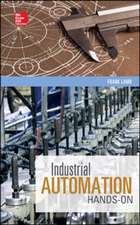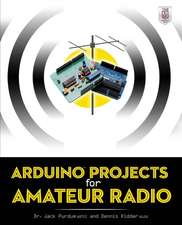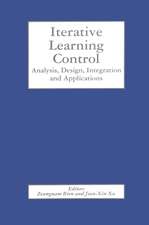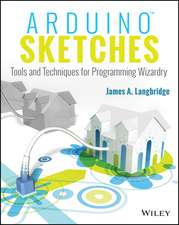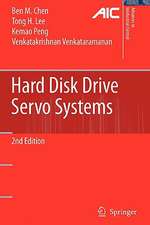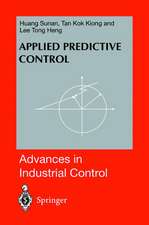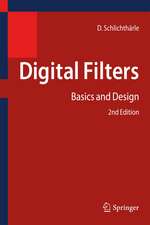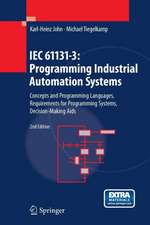Real-time Iterative Learning Control: Design and Applications: Advances in Industrial Control
Autor Jian-Xin Xu, Sanjib K. Panda, Tong Heng Leeen Limba Engleză Hardback – 23 dec 2008
| Toate formatele și edițiile | Preț | Express |
|---|---|---|
| Paperback (1) | 636.30 lei 43-57 zile | |
| SPRINGER LONDON – 21 oct 2010 | 636.30 lei 43-57 zile | |
| Hardback (1) | 642.51 lei 43-57 zile | |
| SPRINGER LONDON – 23 dec 2008 | 642.51 lei 43-57 zile |
Din seria Advances in Industrial Control
- 15%
 Preț: 643.34 lei
Preț: 643.34 lei - 23%
 Preț: 582.63 lei
Preț: 582.63 lei - 18%
 Preț: 783.98 lei
Preț: 783.98 lei - 18%
 Preț: 947.35 lei
Preț: 947.35 lei - 20%
 Preț: 568.24 lei
Preț: 568.24 lei - 15%
 Preț: 643.16 lei
Preț: 643.16 lei - 18%
 Preț: 899.21 lei
Preț: 899.21 lei - 18%
 Preț: 891.33 lei
Preț: 891.33 lei - 18%
 Preț: 740.57 lei
Preț: 740.57 lei - 18%
 Preț: 961.23 lei
Preț: 961.23 lei - 18%
 Preț: 955.08 lei
Preț: 955.08 lei - 15%
 Preț: 645.28 lei
Preț: 645.28 lei - 15%
 Preț: 638.43 lei
Preț: 638.43 lei - 18%
 Preț: 901.11 lei
Preț: 901.11 lei - 18%
 Preț: 1410.94 lei
Preț: 1410.94 lei - 18%
 Preț: 728.91 lei
Preț: 728.91 lei - 20%
 Preț: 1003.77 lei
Preț: 1003.77 lei - 18%
 Preț: 947.35 lei
Preț: 947.35 lei - 15%
 Preț: 643.34 lei
Preț: 643.34 lei - 15%
 Preț: 654.30 lei
Preț: 654.30 lei - 18%
 Preț: 950.52 lei
Preț: 950.52 lei - 15%
 Preț: 644.30 lei
Preț: 644.30 lei - 18%
 Preț: 1393.09 lei
Preț: 1393.09 lei - 18%
 Preț: 950.21 lei
Preț: 950.21 lei - 18%
 Preț: 949.90 lei
Preț: 949.90 lei - 18%
 Preț: 949.42 lei
Preț: 949.42 lei - 18%
 Preț: 950.52 lei
Preț: 950.52 lei - 18%
 Preț: 1113.71 lei
Preț: 1113.71 lei - 15%
 Preț: 650.04 lei
Preț: 650.04 lei - 15%
 Preț: 644.95 lei
Preț: 644.95 lei - 18%
 Preț: 950.33 lei
Preț: 950.33 lei - 18%
 Preț: 948.61 lei
Preț: 948.61 lei - 18%
 Preț: 1112.60 lei
Preț: 1112.60 lei - 15%
 Preț: 644.63 lei
Preț: 644.63 lei - 18%
 Preț: 953.20 lei
Preț: 953.20 lei - 18%
 Preț: 945.62 lei
Preț: 945.62 lei - 15%
 Preț: 640.88 lei
Preț: 640.88 lei - 15%
 Preț: 640.88 lei
Preț: 640.88 lei - 20%
 Preț: 650.92 lei
Preț: 650.92 lei - 18%
 Preț: 1112.60 lei
Preț: 1112.60 lei - 20%
 Preț: 998.36 lei
Preț: 998.36 lei - 15%
 Preț: 643.34 lei
Preț: 643.34 lei - 18%
 Preț: 948.92 lei
Preț: 948.92 lei - 18%
 Preț: 1381.43 lei
Preț: 1381.43 lei - 15%
 Preț: 651.51 lei
Preț: 651.51 lei - 15%
 Preț: 647.08 lei
Preț: 647.08 lei - 20%
 Preț: 563.66 lei
Preț: 563.66 lei - 18%
 Preț: 998.03 lei
Preț: 998.03 lei - 18%
 Preț: 1225.79 lei
Preț: 1225.79 lei
Preț: 642.51 lei
Preț vechi: 755.88 lei
-15% Nou
Puncte Express: 964
Preț estimativ în valută:
122.95€ • 128.69$ • 102.33£
122.95€ • 128.69$ • 102.33£
Carte tipărită la comandă
Livrare economică 31 martie-14 aprilie
Preluare comenzi: 021 569.72.76
Specificații
ISBN-13: 9781848821743
ISBN-10: 1848821743
Pagini: 212
Ilustrații: XVI, 194 p.
Dimensiuni: 155 x 235 x 22 mm
Greutate: 0.48 kg
Ediția:2009
Editura: SPRINGER LONDON
Colecția Springer
Seria Advances in Industrial Control
Locul publicării:London, United Kingdom
ISBN-10: 1848821743
Pagini: 212
Ilustrații: XVI, 194 p.
Dimensiuni: 155 x 235 x 22 mm
Greutate: 0.48 kg
Ediția:2009
Editura: SPRINGER LONDON
Colecția Springer
Seria Advances in Industrial Control
Locul publicării:London, United Kingdom
Public țintă
ResearchCuprins
to ILC: Concepts, Schematics, and Implementation.- Robust Optimal ILC Design for Precision Servo: Application to an XY Table.- ILC for Precision Servo with Input Non-linearities: Application to a Piezo Actuator.- ILC for Process Temperature Control: Application to a Water-heating Plant.- ILC with Robust Smith Compensator: Application to a Furnace Reactor.- Plug-in ILC Design for Electrical Drives: Application to a PM Synchronous Motor.- ILC for Electrical Drives: Application to a Switched Reluctance Motor.- Optimal Tuning of PID Controllers Using Iterative Learning Approach.- Calibration of Micro-robot Inverse Kinematics Using Iterative Learning Approach.- Conclusion.
Textul de pe ultima copertă
Iterative learning control (ILC) has been a major control design methodology for twenty years; numerous algorithms have been developed to solve real-time control problems, from MEMS to batch reactors, characterised by repetitive control operations.
Real-time Iterative Learning Control demonstrates how the latest advances in ILC can be applied to a number of plants widely encountered in practice. The authors provide a hitherto lacking systematic introduction to real-time ILC design and source of illustrative case studies for ILC problem solving; the fundamental concepts, schematics, configurations and generic guidelines for ILC design and implementation are enhanced by a well-selected group of representative, simple and easy-to-learn example applications. Key issues in ILC design and implementation in the linear and nonlinear plants that pervade mechatronics and batch processes are addressed. In particular, the book discusses:
• ILC design in the continuous- and discrete-time domains;
• design in the frequency and time domains;
• design with problem-specific performance objectives including robustness and optimality;
• design by means of classical tools based on Bode plots and state space; and
• iterative-learning-based parametric identification.
Real-time Iterative Learning Control will interest control engineers looking for examples of how this important control technique can be applied to a variety of real-life problems. With its systematic formulation and analysis of different system properties and performance and its exposition of open problems, academics and graduate students working in control will find it a useful reference to the current status of ILC.
Real-time Iterative Learning Control demonstrates how the latest advances in ILC can be applied to a number of plants widely encountered in practice. The authors provide a hitherto lacking systematic introduction to real-time ILC design and source of illustrative case studies for ILC problem solving; the fundamental concepts, schematics, configurations and generic guidelines for ILC design and implementation are enhanced by a well-selected group of representative, simple and easy-to-learn example applications. Key issues in ILC design and implementation in the linear and nonlinear plants that pervade mechatronics and batch processes are addressed. In particular, the book discusses:
• ILC design in the continuous- and discrete-time domains;
• design in the frequency and time domains;
• design with problem-specific performance objectives including robustness and optimality;
• design by means of classical tools based on Bode plots and state space; and
• iterative-learning-based parametric identification.
Real-time Iterative Learning Control will interest control engineers looking for examples of how this important control technique can be applied to a variety of real-life problems. With its systematic formulation and analysis of different system properties and performance and its exposition of open problems, academics and graduate students working in control will find it a useful reference to the current status of ILC.
Caracteristici
Provides the industry-based control engineer with a practical reference for designing and implementing iterative learning control systems in their own plants based on many practical examples Gives the academic researcher systematic formulation and necessary analysis for the solution of a variety of iterative learning control problems and gives an easy-to-access listing of open issues for further research Includes supplementary material: sn.pub/extras

